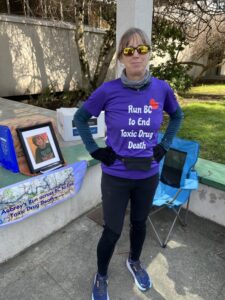The most devastating thing that can happen to a parent is losing their child; a parent should never have to go through that level of pain. But at the end of last August, that’s exactly what happened to Camosun College School of Access instructor Jessica Michalofsky when she lost her son Aubrey to toxic drug poisoning.
In honour of her son and other parents who have lost their loved ones to the drug crisis, Michalofsky is running across southern BC in May and June to help raise awareness (the run is slated to start in Nelson on May 21 and end in Victoria on June 25). Running for awareness is nothing new for Michalofsky, who has been holding protest runs around the Ministry of Health building since late last year.
“I’m a teacher, and I’m a runner, and I’m a mom who lost her son to drug poisoning in the end of August 2022,” she says. “And I’ve been running marathons around the Ministry of Health since October, to protest the government’s inaction in solving this toxic drug crisis and stopping these preventable deaths.”
Michalofsky’s upcoming runs will consist of her running 30 kilometres a day. There will be public rallies at all of the small communities she visits; she says that everyone is welcome to come to the rallies.

“This May and June I’m going to be running across southern BC in support of people who use drugs and their families,” says Michalofsky. “So, currently in British Columbia seven people are dying a day from toxic drug poisoning. And we are in the seventh year of a publicly declared public health emergency. And yet, the rate of death is going up not down. I think the rate is now double what it was when the public health emergency was announced back in 2016. So, I’m running across BC to make people aware of the resources that exist and to protect themselves and their families.”
The government’s plan in declaring the drug crisis a public health emergency has offered no help at all, says Michalofsky.
“Death by toxic drugs is the leading cause of death for people ages 19 to 39, and it’s the second leading cause of death for people in older age groups,” says Michalofsky. “So, we’re not most likely to be killed in car accidents or drowning during the summer; we’re most likely to be killed by toxic drugs.”
Michalofsky says that the progress she’s made since her runs in October of last year has been less than fruitful. While she’s met with politicians such as minister of Mental Health and Addictions Sheila Malcolmson and provincial health officer Bonnie Henry, she’s not content with what’s being done.
“I’m frustrated with politicians that don’t really seem to be listening to the solutions that are being presented to them,” she says.
Michalofsky says that the NDP’s recent announcement about funding for treatment centres is a prime example of this.
“So, currently, for instance, the NDP government has announced what seems like a whole lot of money for treatment centres, but the problem is, it’s not only people who consider themselves addicted to drugs who are dying,” she says. “People who are just, maybe, weekend partiers or first-time users are dying from this. So, having treatment beds available will not stop students, for instance, from dying who are just trying something. We need better solutions. We need safe access to drugs, we need to cut off the black market supply of drugs, which is the problem right now. The drugs are contaminated with all sorts of things because criminals are creating them and they’re not creating very consistent substances, so people who use drugs never know what they’re getting anymore.”
There needs to be better solutions to this crisis, says Michalofsky, and that’s what her runs are promoting.
“I want people to be alarmed, I want people to be worried. Because, at this point I think everybody knows somebody who has died from this and I think that people aren’t taking it seriously enough… A lot of people are dying from this, and the government’s not taking it seriously, and the approaches they’re coming up with, a lot of them are paternalistic and I think are not going to help.”
